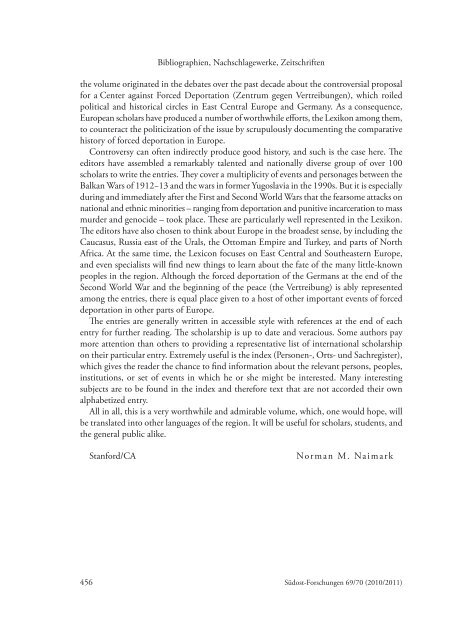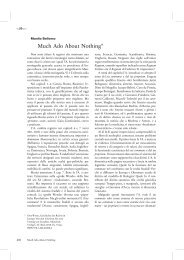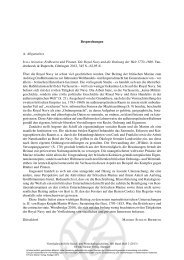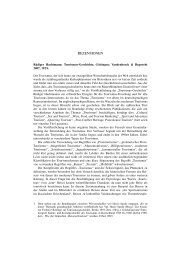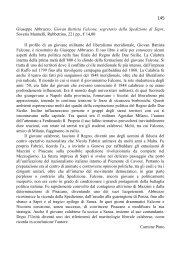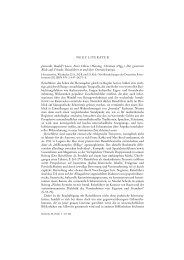- Seite 1 und 2: Rezensionen Die folgende Gliederung
- Seite 3 und 4: Rezensionen berücksichtigten Einze
- Seite 5 und 6: Rezensionen und Memoiren, Korrespon
- Seite 7 und 8: Rezensionen albanischen Auslandskol
- Seite 9 und 10: Rezensionen und albanischer Sprache
- Seite 11 und 12: Rezensionen Zu jedem Artikel ist de
- Seite 13 und 14: Rezensionen vieler albanologischer
- Seite 15: Rezensionen Die zu kommunistischer
- Seite 19 und 20: Rezensionen pern, aber eben auch de
- Seite 21 und 22: Rezensionen sind. Hier muss man ger
- Seite 23 und 24: Rezensionen Eingeteilt sind die bei
- Seite 25 und 26: Rezensionen Eine kultursoziologisch
- Seite 27 und 28: Rezensionen Quellen Franz tinnefeld
- Seite 29 und 30: Rezensionen sind, auch wenn die von
- Seite 31 und 32: Rezensionen zu trüben. Es ist erfo
- Seite 33 und 34: Rezensionen Deutsch, beide Texte mi
- Seite 35 und 36: Rezensionen für Unterricht von Fra
- Seite 37 und 38: Rezensionen ternationalen Zusammena
- Seite 39 und 40: Rezensionen Nenad Stefanov, „Vom
- Seite 41 und 42: Rezensionen mangelhaft. Dies liegt
- Seite 43 und 44: Rezensionen Tagungen und Publikatio
- Seite 45 und 46: Rezensionen Wintle makes use of pub
- Seite 47 und 48: Rezensionen The lands and peoples o
- Seite 49 und 50: Rezensionen Autor auch auf ältere
- Seite 51 und 52: Rezensionen Formen der Kooperation
- Seite 53 und 54: Rezensionen griffs der brokerage we
- Seite 55 und 56: Rezensionen dieser Volksgruppe durc
- Seite 57 und 58: Rezensionen gelegentlich in den Fu
- Seite 59 und 60: Rezensionen angrenzte 1 und deren t
- Seite 61 und 62: Rezensionen staates beinhaltete, zu
- Seite 63 und 64: Rezensionen und der konfessionellen
- Seite 65 und 66: Rezensionen Jakob-Robinson, die Vuk
- Seite 67 und 68:
Rezensionen Christian Voss (Ein lin
- Seite 69 und 70:
Rezensionen Fremdherrschaft in jene
- Seite 71 und 72:
Rezensionen Spatial Conceptions of
- Seite 73 und 74:
Rezensionen insbesondere in den gr
- Seite 75 und 76:
Rezensionen den Nationalismen einer
- Seite 77 und 78:
Rezensionen chanismen von Minderhei
- Seite 79 und 80:
Rezensionen Nicoară Beldiceanu 1 B
- Seite 81 und 82:
Rezensionen In contrast with a nove
- Seite 83 und 84:
Rezensionen begründete Totenfürso
- Seite 85 und 86:
Rezensionen Namen Mehmeds II. Sie v
- Seite 87 und 88:
Rezensionen Interessant ist die Tat
- Seite 89 und 90:
Rezensionen Geschichte: „Frühe N
- Seite 91 und 92:
Rezensionen behandelten Aspekte dur
- Seite 93 und 94:
Rezensionen Humanisten sowie die vo
- Seite 95 und 96:
Rezensionen ästhetischen Gesichtsp
- Seite 97 und 98:
Rezensionen „Mut zum Wort“ ist
- Seite 99 und 100:
Rezensionen Fokus auf politische un
- Seite 101 und 102:
Rezensionen Gábor ágoSton, Feuerw
- Seite 103 und 104:
Rezensionen im 17. Jh. (129−138).
- Seite 105 und 106:
Rezensionen 1 Auf diesen Titel hat
- Seite 107 und 108:
Rezensionen auch kurz Ekkehard Eick
- Seite 109 und 110:
Rezensionen in ihrem Bestand gefäh
- Seite 111 und 112:
Rezensionen einen kompletten Neuent
- Seite 113 und 114:
Rezensionen montenegrinischen Stäm
- Seite 115 und 116:
Rezensionen den, recht groß war un
- Seite 117 und 118:
Rezensionen quelques essais philoso
- Seite 119 und 120:
Rezensionen Bevölkerungsmehrheit v
- Seite 121 und 122:
Rezensionen wodurch diese Nation gr
- Seite 123 und 124:
Rezensionen Erzbischöfe von Kalocs
- Seite 125 und 126:
Rezensionen Interessant ist hier da
- Seite 127 und 128:
Rezensionen Ricerca di identità, r
- Seite 129 und 130:
Rezensionen listische Fachzeitschri
- Seite 131 und 132:
Rezensionen rath“ überein, den M
- Seite 133 und 134:
Rezensionen Orient und osmanischen
- Seite 135 und 136:
Rezensionen wickelte. Diesem Hafen
- Seite 137 und 138:
Rezensionen Triester Knoten zu durc
- Seite 139 und 140:
Rezensionen matien (sowie im Küste
- Seite 141 und 142:
Rezensionen tersuchten Archive in R
- Seite 143 und 144:
Rezensionen gleichsam zum Auslöser
- Seite 145 und 146:
Rezensionen Petrungaro nimmt Bezug
- Seite 147 und 148:
Rezensionen Kanada und dem autonome
- Seite 149 und 150:
Rezensionen nationalstaatlicher Log
- Seite 151 und 152:
Rezensionen in einem Scharmützel m
- Seite 153 und 154:
Rezensionen Geschichte: Die Eigenst
- Seite 155 und 156:
Rezensionen Catherine horel, Soldat
- Seite 157 und 158:
Rezensionen schreibt. Dies ist auch
- Seite 159 und 160:
Rezensionen Dieses Streckensystem,
- Seite 161 und 162:
Rezensionen Marie-Janine calic, Ges
- Seite 163 und 164:
Rezensionen jugoslawischen Zerstör
- Seite 165 und 166:
Rezensionen Um es vorab zu sagen, k
- Seite 167 und 168:
Rezensionen onen (Kriegsfürsorgeam
- Seite 169 und 170:
Rezensionen von wenigen Monaten, eh
- Seite 171 und 172:
Rezensionen Lebenswelten“ der ung
- Seite 173 und 174:
Rezensionen Albaner in und nach Jug
- Seite 175 und 176:
Rezensionen Auch hier geht der Auto
- Seite 177 und 178:
Rezensionen Der erste Teil des Band
- Seite 179 und 180:
Rezensionen Den vierten Teil, der d
- Seite 181 und 182:
Rezensionen versucht, die Türkei i
- Seite 183 und 184:
Rezensionen Zwischen Nazis und Pers
- Seite 185 und 186:
Rezensionen Fakten im engeren Sinne
- Seite 187 und 188:
Rezensionen sogar wegen der „nati
- Seite 189 und 190:
Rezensionen rung der Bukowina. Mün
- Seite 191 und 192:
Rezensionen situation. Mićić does
- Seite 193 und 194:
Rezensionen wäre, erscheint das In
- Seite 195 und 196:
Rezensionen Ende 2010 erschien der
- Seite 197 und 198:
Rezensionen wieder auf die Gefahren
- Seite 199 und 200:
Rezensionen „Das neue Hellas“ v
- Seite 201 und 202:
Rezensionen und Schwäche eines „
- Seite 203 und 204:
Rezensionen lenbilder werden hierdu
- Seite 205 und 206:
Rezensionen auf gelungene Weise mit
- Seite 207 und 208:
Rezensionen stritten. Der inoffizie
- Seite 209 und 210:
Rezensionen The second chapter (127
- Seite 211 und 212:
Rezensionen durch den Band nahegele
- Seite 213 und 214:
Rezensionen seit dem gewaltvollen Z
- Seite 215 und 216:
Rezensionen melte Dokumentation sol
- Seite 217 und 218:
Rezensionen italiani 1940−1943. M
- Seite 219 und 220:
Rezensionen Reduktion der Geschicht
- Seite 221 und 222:
Rezensionen Blickwinkel zu nutzen u
- Seite 223 und 224:
Rezensionen Gedächtnispolitik und
- Seite 225 und 226:
Rezensionen die Autoren der überge
- Seite 227 und 228:
Rezensionen Kunstgeschichte, Volksk
- Seite 229 und 230:
Rezensionen aus Metsovo über den F
- Seite 231 und 232:
Rezensionen Die Präsentation des M
- Seite 233 und 234:
Rezensionen Gottfried August Bürge
- Seite 235 und 236:
Rezensionen Im dritten Teil ist die
- Seite 237 und 238:
Rezensionen wobei die von ihm detai
- Seite 239 und 240:
Rezensionen Im „Eigenbeitrag“ v
- Seite 241 und 242:
Rezensionen Es scheint jedoch, dass
- Seite 243 und 244:
Rezensionen Der letzte Abschnitt be
- Seite 245 und 246:
Rezensionen Sprache und Sprachwisse
- Seite 247 und 248:
Rezensionen wird der Topos vom mult
- Seite 249 und 250:
Rezensionen Edition von Roques 1932
- Seite 251 und 252:
Rezensionen im ersten Teil eine „
- Seite 253 und 254:
Rezensionen neuem Material, die - b
- Seite 255 und 256:
Rezensionen schichte der Slawistik
- Seite 257 und 258:
Rezensionen band „Αλεξανδ
- Seite 259 und 260:
Rezensionen Gerade das Fehlen der z
- Seite 261 und 262:
Rezensionen einschließlich Lexikol
- Seite 263 und 264:
Rezensionen muss hier aber auch auf
- Seite 265 und 266:
Rezensionen Moskauer Dissertation z
- Seite 267 und 268:
Rezensionen Der vorliegende Sammelb
- Seite 269 und 270:
Rezensionen Diözese Pult/Pulati. W
- Seite 271 und 272:
Rezensionen Übersetzung durch den
- Seite 273 und 274:
Rezensionen schen ein, verfolgt Spu
- Seite 275 und 276:
Rezensionen gab es sogar Komplikati
- Seite 277 und 278:
Rezensionen Literatur- und Theaterw
- Seite 279 und 280:
Rezensionen len Literaturtheorie ni
- Seite 281 und 282:
Rezensionen dass der Herausgeber de
- Seite 283 und 284:
Rezensionen breiten Leserkreis find
- Seite 285 und 286:
Rezensionen französisch wiedergab.
- Seite 287 und 288:
Rezensionen Anton SterBling, „Am
- Seite 289 und 290:
Rezensionen Athen, Wien Walter Puch


